Iran chief negotiator calls for removal of all U.S. sanctions

Ali Bagheri Kani, Deputy Foreign Minister of Iran who will lead the Iranian negotiating team in Vienna, outlined conditions for the talks to succeed. He stressed that any progress on U.S. return to the 2015 Iran deal, officially known as the Joint Comprehensive Plan of Action (JCPOA), must be preceded by the scrapping of all American sanctions, and a guarantee that a future administration in Washington will not once again renege on the agreement as former U.S. President Donald Trump had done.
In remarks to The Independent, Bagheri Kani complained that the Biden administration was repeating some of the mistakes of its predecessor and continuing with the “failed policy” of “maximum pressure” on Tehran, which has caused “political bewilderment.”
Bagheri Kani told The Independent, “The removal of all JCPOA related sanctions such as the sanctions imposed within the framework of ‘maximum pressure’ campaign is the necessary condition for success of the negotiations.”
“Demanding guarantees from the other party not to exit the deal, not to impose and enforce new sanctions, and not to reinstate and reapply the previous sanctions is aimed at neutralizing the possibility that political chaos in the United States could have an impact on its international behavior.”
The remarks came a few days before the Vienna talks kick off after a five-month hiatus.
The chief Iranian negotiator said the Biden administration is following in the footsteps of its predecessor in terms of clinging to sanctions policy against Iran.
“Regrettably, the failed policy of pursuing the maximum pressure campaign, which began in the Trump administration, remains in the agenda of the Biden administration,” Bagheri Kani said, adding, “President Biden needs to remove the sanctions in order to relieve himself of what we see as political bewilderment and the pursuit of failed and inhumane policies of the Trump administration.”
While failing to advance talks on the nuclear issue, the Biden administration’s actions on another major foreign policy concern, retreating from Afghanistan, had damaged its credibility in the West Asia region and helped Iran’s relations with countries in the region, Bagheri Kani maintained.
“The U.S. escape from Afghanistan demonstrated yet another instance where the United States is not a reliable partner for anyone. We are in close, constant and intense dialogue with countries of the region”, he said.
Bagheri Kani had also visited a number of other European capitals to talk about the JCPOA. Tehran holds that the European signatories to the deal have not done enough to defend it against U.S. sanctions.
He said, “Europeans should make amends for their non-compliance regarding the JCPOA through implementing practical steps to remove the sanctions. We measure the stances of other countries considering our own interests; and their contact and interaction with the United States is not a matter of discussion for us. A country that has a seat at a negotiating table must be able to pursue independent policies, otherwise, why should it be at the table?”
The Iranians, going into the Vienna talks, have complained about the unconstructive statements and actions coming from the U.S. and its European allies.
The spokesman for Iran’s Foreign Ministry, Saeed Khatibzadeh, voiced these complaints on Twitter. He said Iran has done a series of constructive measures ahead of Vienna talks but these measures were not reciprocated by the West.
“Ahead of #ViennaTalks, US/E3: - Issue bogus statements - Add sanctions - Conjure distorted narratives - Keep mum on Israel's threats. Iran: - Forms high-level nego team - Calls for quick good deal & full implementation of JCPOA/2231 - Holds regional consultations,” the spokesman said.
Source: Tehran Times

